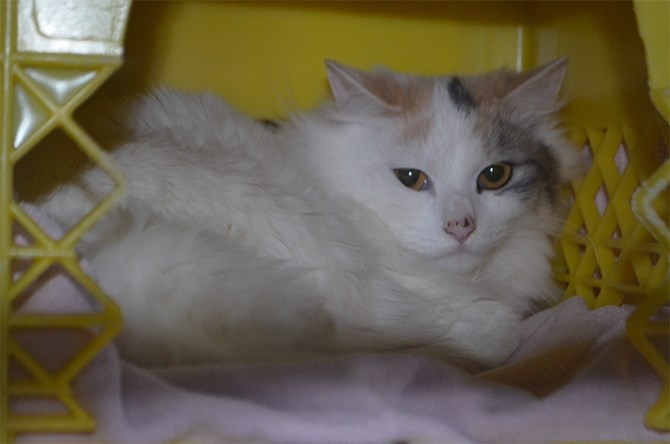
Mental illness is a primary driver behind those responsible for pet hoarding, such as that experienced by the South Okanagan branch of the SPCA where a single hoarder has surrendered nearly 200 cats over the past couple of years.
Image Credit: SUBMITTED / BC SPCA
February 01, 2019 - 9:00 PM
PENTICTON - The ongoing case of a single Penticton animal hoarder surrendering nearly 200 cats to the South Okanagan branch of the SPCA has highlighted the need to understand the behaviour of such people as a mental illness.
Staff and volunteers spent most of last fall treating and adopting out 111 cats from the Penticton woman only to receive a new intake of 30 more cats from the same person earlier this week.
B.C. SPCA communications manager Lori Chortyk recently wrote an article for one of the society’s publications describing the hoarding issue and the damage hoarding does to animals.
Chortyk says while it’s easy to get angry at someone intentionally harming an animal, with animal hoarders, it’s not so black and white.
“Many of them are struggling with mental health issues and may not be aware of the harm they are causing,” says B.C. SPCA Const. Kathy Woodward, who has conducted many animal investigations over her 20 years with the SPCA.
“While our job as cruelty investigators is to intervene to rescue the animals, the owner often needs just as much help and support,” she says.
Chortyk describes animal hoarding as a complex psychological condition that can result in an individual’s overwhelming need to acquire animals, a distorted view of their ability to care for them and an excessive and intense emotional attachment.
She notes three types of hoarders, as outlined by Dr. Gary Patronek, a veterinarian and internationally recognized expert on animal hoarding:
Overwhelmed Caregivers: Individuals often well-intentioned in their behaviour, making an initial effort to provide the proper care for the animals, but ultimately becoming overwhelmed and unable to care for the animals, or themselves.
Rescuer Hoarders: Hoarders who actively acquire animals due to their strong sense of mission to save animals from death or other circumstances. They believe they are the only ones who can provide adequate care for the animals and will not seek assistance of animal welfare agencies or authorities.
Exploiter Hoarders: These individuals actively acquire animals to serve their own needs, lacking guilt for the harm their actions may cause other humans or the animals.
They may also breed animals for show or sale and only have moderate insight regarding the animals’ condition, or how to properly care for them.
To contact a reporter for this story, email Steve Arstad or call 250-488-3065 or email the editor. You can also submit photos, videos or news tips to the newsroom and be entered to win a monthly prize draw.
We welcome your comments and opinions on our stories but play nice. We won't censor or delete comments unless they contain off-topic statements or links, unnecessary vulgarity, false facts, spam or obviously fake profiles. If you have any concerns about what you see in comments, email the editor in the link above.
News from © iNFOnews, 2019